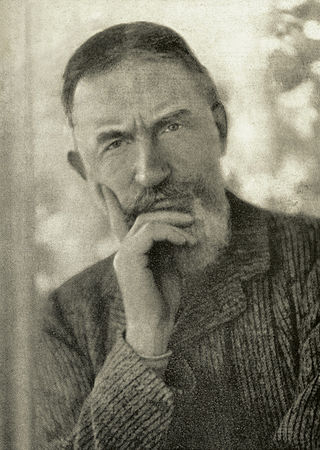
George Bernard Shaw, known at his insistence as Bernard Shaw, was an Irish playwright, critic, polemicist and political activist. His influence on Western theatre, culture and politics extended from the 1880s to his death and beyond. He wrote more than sixty plays, including major works such as Man and Superman (1902), Pygmalion (1913) and Saint Joan (1923). With a range incorporating both contemporary satire and historical allegory, Shaw became the leading dramatist of his generation, and in 1925 was awarded the Nobel Prize in Literature.
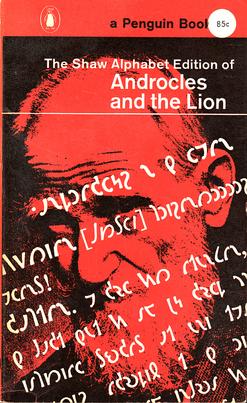
The Shavian alphabet is a constructed alphabet conceived as a way to provide simple, phonemic orthography for the English language to replace the inefficiencies and difficulties of conventional spelling using the Latin alphabet. It was posthumously funded by and named after Irish playwright Bernard Shaw.
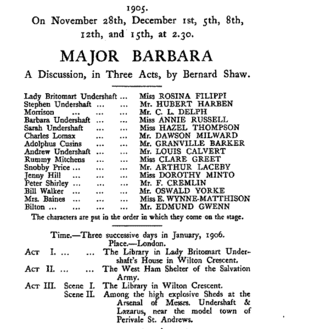
Major Barbara is a three-act English play by George Bernard Shaw, written and premiered in 1905 and first published in 1907. The story concerns an idealistic young woman, Barbara Undershaft, who is engaged in helping the poor as a Major in the Salvation Army in London. For many years, Barbara and her siblings have been estranged from their father, Andrew Undershaft, who now reappears as a rich and successful munitions maker. The father gives money to the Salvation Army, which offends Barbara because she considers it "tainted" wealth. The father argues that poverty is a worse problem than munitions and claims that he is doing more to help society by giving his workers jobs and a steady income than she is doing by giving people free meals in a soup kitchen.
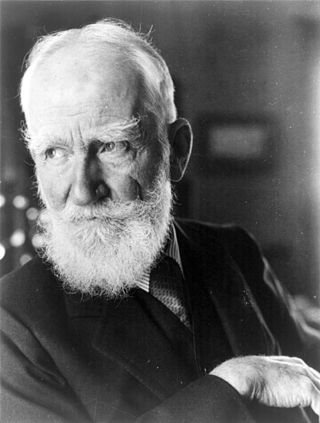
Back to Methuselah (A Metabiological Pentateuch) by George Bernard Shaw consists of a preface (The Infidel Half Century) and a series of five plays: In the Beginning: B.C. 4004 (In the Garden of Eden), The Gospel of the Brothers Barnabas: Present Day, The Thing Happens: A.D. 2170, Tragedy of an Elderly Gentleman: A.D. 3000, and As Far as Thought Can Reach: A.D. 31,920.

The Apple Cart: A Political Extravaganza is a 1928 play by George Bernard Shaw. It is a satirical comedy about several political philosophies which are expounded by the characters, often in lengthy monologues. The plot follows the fictional English King Magnus as he spars with, and ultimately outwits, Prime Minister Proteus and his cabinet, who seek to strip the monarchy of its remaining political influence. Magnus opposes the corporation "Breakages, Limited", which controls politicians and impedes technical progress.
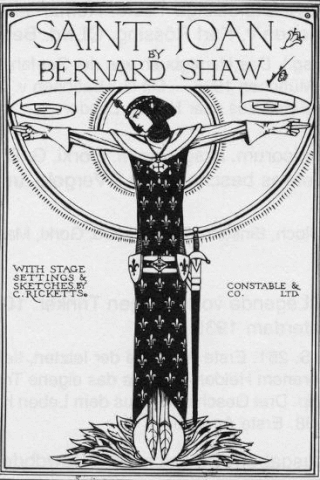
Saint Joan is a play by George Bernard Shaw about 15th-century French military figure Joan of Arc. Premiering in 1923, three years after her canonization by the Roman Catholic Church, the play reflects Shaw's belief that the people involved in Joan's trial acted according to what they thought was right. He wrote in his preface to the play:
There are no villains in the piece. Crime, like disease, is not interesting: it is something to be done away with by general consent, and that is all [there is] about it. It is what men do at their best, with good intentions, and what normal men and women find that they must and will do in spite of their intentions, that really concern us.

The Doctor's Dilemma is a play by George Bernard Shaw first staged in 1906. It was published in 1909. It is a problem play about the moral dilemmas created by limited medical resources, and the conflicts between the demands of private medicine as a business and a vocation.

In Good King Charles's Golden Days is a play by George Bernard Shaw, subtitled A True History that Never Happened.

Too True to Be Good (1932) is a comedy written by playwright George Bernard Shaw at the age of 76. Subtitled "A Collection of Stage Sermons by a Fellow of the Royal Society of Literature", it moves from surreal allegory to the "stage sermons" in which characters discuss political, scientific and other developments of the day. The second act of the play contains a character based on Shaw's friend T. E. Lawrence.
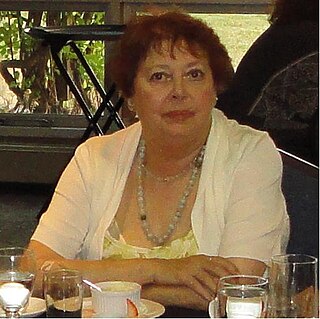
Rodelle Selma Horwitz Weintraub is an American author, editor, professor, and public speaker. The focus of her career includes specializing in the works of George Bernard Shaw. She is the assistant editor of The Shaw Review. In 1982, the West Chester University of Pennsylvania the Weintraub Center for the Study of the Arts and Humanities was endowed by Weintraub and her husband, Stanley Weintraub. The center holds a collection of their books, papers and memorabilia. She was one of the founders of the Bellefonte–State College Jewish Community Center, established in 1955, which became known as Congregation Brit Shalom. In 1963, she was named as the president of the synagogue, which established her as the first woman in the US to head a Jewish congregation.

The Festival Theatre, now known as Malvern Theatres, is a theatre complex on Grange Road in Malvern, Worcestershire, England. Malvern Theatres, housed in the Winter Gardens complex in the town centre of Great Malvern, has been a provincial centre for the arts since 1885. The theatre became known for its George Bernard Shaw productions in the 1930s and from 1977 onwards, along with the works of Edward Elgar. Up until 1965, 19 different plays of Shaw were produced at the Malvern Festival Theatre, and six premiered here, including The Apple Cart at the opening Malvern Festival in 1929, Geneva, a Fancied Page of History in Three Acts in August 1938 and In Good King Charles's Golden Days in August 1939.
Roy Limbert (1893–1954) was a prominent London West End theatre director and producer between the 1930s and the 1950s.
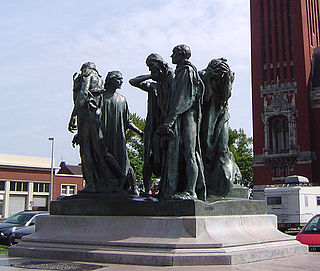
The Six of Calais is a one-act play by George Bernard Shaw. It was inspired by Auguste Rodin's sculpture The Burghers of Calais. It is a historical comedy about the conflict between Edward III of England and his wife Philippa of Hainault over his plans to punish the leading citizens of Calais for resisting the 1346 siege.

Cymbeline Refinished (1937) is a play-fragment by George Bernard Shaw in which he writes a new final act to Shakespeare's play Cymbeline. The drama follows from Shaw's longstanding need to reimagine Shakespeare's work, epitomised by his play Caesar and Cleopatra and his late squib Shakes versus Shav.

Farfetched Fables (1948) is a collection of six short plays by George Bernard Shaw in which he outlines several of his most idiosyncratic personal ideas. The fables are preceded by a long preface. The ideas in the plays and the preface have been called the "violent unabashed prejudices of an eccentric".

Geneva, a Fancied Page of History in Three Acts (1938) is a topical play by George Bernard Shaw. It describes a summit meeting designed to contain the increasingly dangerous behaviour of three dictators, Herr Battler, Signor Bombardone, and General Flanco.

Jitta's Atonement (1923) is an adaptation by George Bernard Shaw of the play Frau Gitta's Sühne by Siegfried Trebitsch. It is about a woman who has to atone to her husband for having an affair with his best friend. The atonement of both Jitta and other characters take unexpected forms. Shaw dramatically rewrote the last part of the play, giving it a more characteristically Shavian tone.

O'Flaherty V.C., A Recruiting Pamphlet (1915) is a comic one-act play written during World War I by George Bernard Shaw. The plot is about an Irish soldier in the British army returning home after winning the Victoria Cross. The play was written at a time when the British government was promoting recruitment in Ireland, while many Irish republicans expressed opposition to fighting in the war.
Breakages, Limited is a fictional corporation that figures in George Bernard Shaw's 1928 play The Apple Cart. It has acquired a monopoly of all repair trades. "Breakages" is the focus of a critique of capitalism, shown as exerting undue political influence while hampering beneficial technological progress to protect its own interests.









